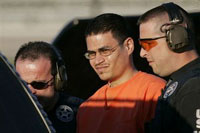Trial on seven Miami men plotting to explode Sears Tower delayed
A mistrial was declared for six of seven men who were accused of attempting to unite with al-Qaida to blow up Chicago's Sears Tower. One of seven men was acquitted by federal judge.

The government planned the retrial next year, and the new jury would be picked starting January, 7, said federal prosecutor Richard Gregorie.
The U.S. government used this case as an illustration to the dangers of homebred terrorism. The Bush administration declared its post-Sept. 11 success in detecting and frustrating terrorists’ plans in their earliest stages.
Lyglenson Lemorin, 32, who had been accused of being a “henchman” of alleged leader Narseal Batiste, buried his face in his hands when the judge read out his acquittal.
Lemorin, a U.S. resident of Haitian origin, would not be immediately released being subject to an immigration hold.
As for other defendants, the jury deadlocked after nine days of hearing the case over four terrorism-related charges that carry 70 years in prison all in all. Twice the jury sent notes to the judge saying they cannot carry out the verdict but they were told to keep trying. After they sent the third note, the mistrial was declared.
"We believe no further progress can be made," it said. U.S. District Judge Joan Lenard read the note in court.
Prosecutors said the "Liberty City Seven" - so-named because they operated out of a warehouse in Miami's blighted Liberty City section - swore allegiance to al-Qaida and hoped to forge an alliance to carry out bombings against America's tallest skyscraper, the FBI's Miami office and other federal buildings.
The group never actually made contact with al-Qaida. Instead, a paid FBI informant known as Brother Mohammed posed as an al-Qaida emissary.
The defense portrayed the seven men as hapless figures who were either manipulated and entrapped by the FBI or went along with the plot to con "Mohammed" out of $50,000.
The group never actually made contact with al-Qaida and never acquired any weapons or explosives. Prosecutors said no attack was imminent, acknowledging that the alleged terror cell was "more aspirational than operational."
But then-Attorney General Alberto Gonzales said after the arrests in mid-2006 that the group was emblematic of the "smaller, more loosely defined cells who are not affiliated with al-Qaida, but who are inspired by a violent jihadist message."
And U.S. Attorney R. Alexander Acosta of Miami said: "Our mission is to disrupt these cells if possible before they acquire the capability to implement their plans."
Outside the courtroom, jury foreman Jeff Agron said the group took four votes but was split roughly evenly between guilt and innocence for the other six men. They spent hours viewing and listening to FBI recordings of meetings and conversations involving Batiste and the others, he said.
"People have different takes on what they saw, on what was said and what that meant," said Agron, 46, a teacher and lawyer. "My personal belief is that there may have been sufficient evidence on some of them as to some of the counts."
Agron said the evidence was weakest against Lemorin, who had moved with his wife and children to Atlanta and gotten a job at a shopping mall after splitting with Batiste months before the group was arrested.
In a statement to the FBI, Lemorin said he never wanted to be associated with al-Qaida and that he knew "nothing good would come from this."
The judge, who imposed a gag order on all lawyers in the case, refused a request by Lemorin's lawyer, Joel DeFabio, for Lemorin to be allowed to speak with reporters after the verdict.
The Liberty City Seven, who included immigrants from Haiti and the Dominican Republic, adhered to a sect called the Moorish Science Temple that blends elements of Islam, Christianity and Judaism.
The government case was built largely on FBI surveillance video and some 12,000 telephone intercepts.
One key piece of evidence was a video of the seven men taking an oath of loyalty to al-Qaida and Osama bin Laden in a March 2006 ceremony.
Also, the group's leader, 33-year-old Batiste, was overheard talking about starting a "full ground war" against the U.S. government by bringing down the 110-story Sears Tower - an attack he said would be "as good or greater than 9/11."
Batiste also supplied the informant with detailed wish lists that included assault rifles, bulletproof vests, uniforms, motorcycles and $50,000 in cash, prosecutors said.
However, Batiste testified he faked interest in the plot and really only wanted the money.
Members of the group also took reconnaissance photos of the FBI office and downtown federal buildings at the informant's request.
Defense lawyers contended that the informant and an overzealous FBI were responsible for pushing the alleged conspiracy along.
"This was all written, directed and produced by the FBI," said defense attorney Albert Levin.
Subscribe to Pravda.Ru Telegram channel, Facebook, RSS!




